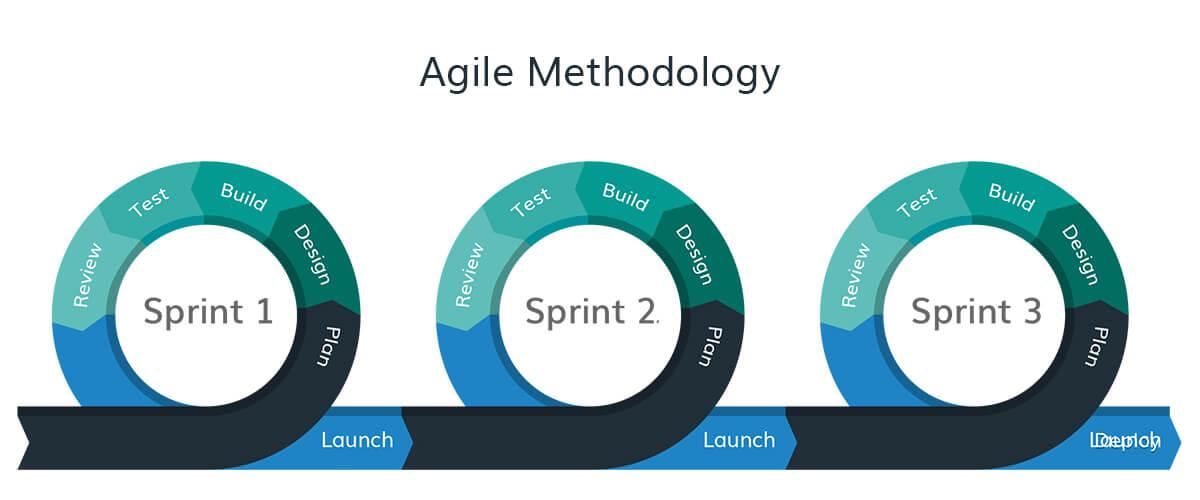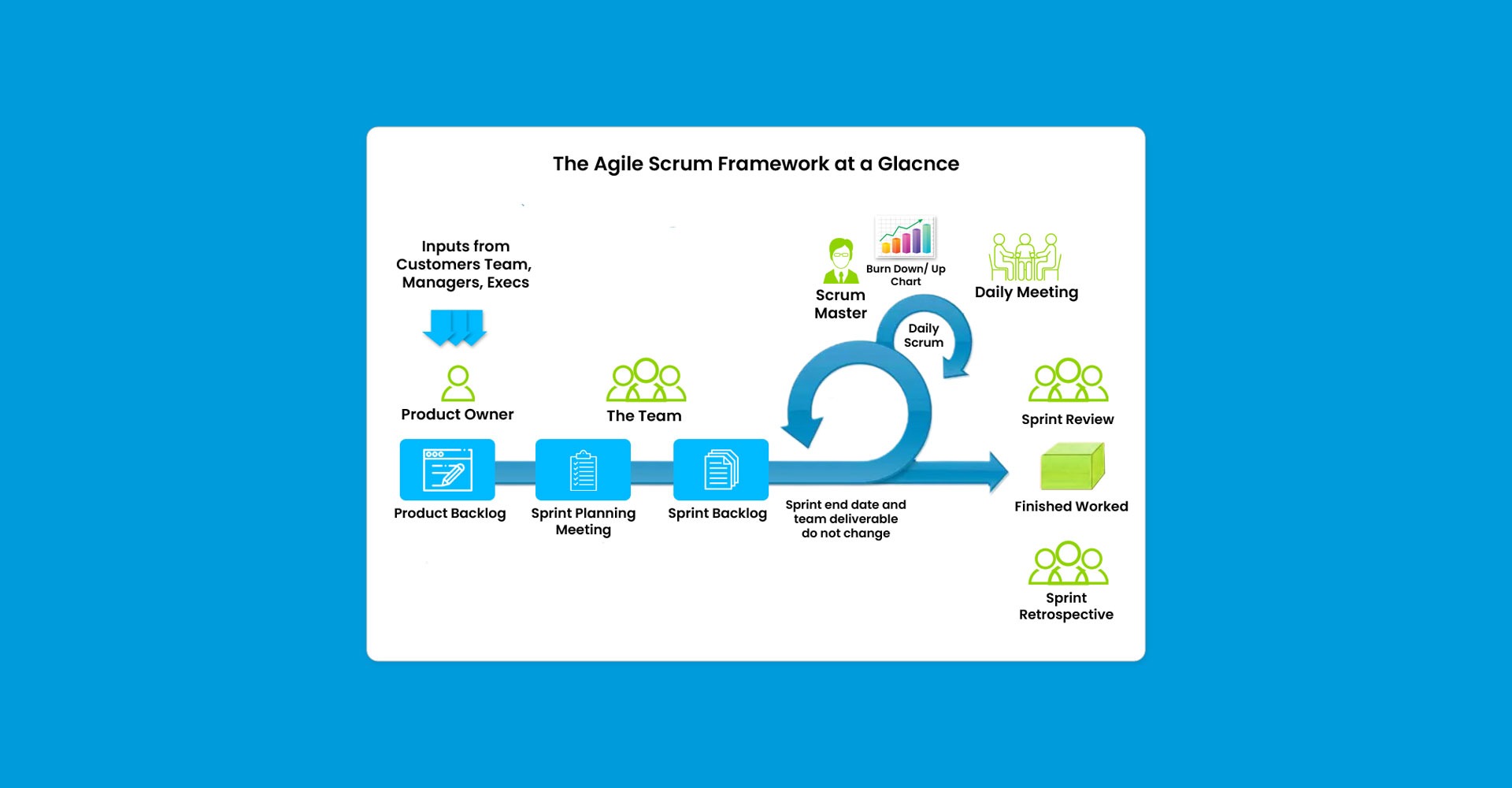Agile in Software Development

In today’s fast-paced world, mobile app development has become a critical part of businesses of all sizes. With millions of apps available in app stores, the competition is fierce, and mobile app developers need to ensure that their apps stand out from the crowd.
This is where the methodology of agile for mobile app development comes in, as it provides a framework that emphasizes collaboration, flexibility, and quick iterations. In this blog, we will explore how agile methodology can be used for mobile app development and its benefits for businesses and developers.
What is Agile?
An agile approach to software development emphasizes collaboration, flexibility, and quick iterations. The agile framework was first introduced in the early 2000s as a response to the limitations of traditional software development methodologies such as the Waterfall model.
The fundamental principles of agile methods are:
- Individuals and interactions over processes and tools
- Working software over comprehensive documentation
- Client collaboration over contract negotiation
- Responding to change by following a plan
How does Agile work?
Agile methodology is based on the idea of breaking a project down into smaller, more manageable parts. Scrum is one of the most popular frameworks used in agile methodology. It is an iterative and incremental approach to software development that emphasizes collaboration, flexibility, and rapid delivery.
Scrum has three main roles: the product owner, the scrum master, and the development team.
Sprints are the heart of the Scrum process. They are time-boxed periods of development that typically last two to four weeks. During a sprint, the development team works on a set of prioritized items from the product backlog, aiming to complete as many of them as possible by the end of the sprint. At the end of each sprint, the team reviews their work and demonstrates the new features or functionality to stakeholders.
Scrum emphasizes collaboration and communication, with daily stand-up meetings being a key component of the process. These meetings are short (typically 15 minutes) and give team members the opportunity to share progress, discuss any issues, and plan their work for the day.
By focusing on collaboration, communication, and rapid delivery, Scrum helps teams to deliver high-quality software products that meet the needs of their clients.
How is Agile relevant in mobile app development?
Mobile app development is a highly competitive and rapidly evolving field, and the agile methodology is well-suited to the unique challenges of this environment. Mobile app development requires quick iterations and frequent updates to keep up with changing user needs and technological advancements. Agile mobile app development enables development teams to quickly adapt to these changes and deliver working software in a timely and efficient manner.
Moreover, mobile app development involves multiple stakeholders, including product owners, designers, developers, testers, and marketing teams. The agile framework promotes collaboration and communication among these stakeholders, ensuring that everyone is working towards a common goal and that the product is aligned with the client’s needs.
Top benefits of using Agile for mobile app development:
Here are some of the major pointers which make it evident why agile methodology for mobile app development is beneficial and efficient.
1. Faster time-to-market: Agile methodology enables the development team to work in short sprints and deliver working product increments. The stakeholders review and test these increments, allowing for feedback and improvements in the next sprint. This iterative approach leads to faster time-to-market as the product is delivered incrementally, ensuring that it meets the client’s requirements.
2. Improved collaboration: The team works closely with the stakeholders to understand their requirements and expectations, which helps to build a product that meets the client’s needs. Regular meetings and reviews enable the stakeholders to provide feedback, ensuring that the product meets their expectations. This leads to higher-quality products and increased client satisfaction.
3. Flexibility: Agile methodology allows changes to be made in the project scope and requirements at an early stage of the development process. This flexibility enables the team to adapt to the market and client’s needs. For example, if the market or client requirements change, the development team can adjust the project scope and requirements accordingly. This ensures the product meets the client’s needs and expectations, resulting in higher client satisfaction.
4. Higher quality: The agile methodology emphasizes the delivery of working product increments by the end of each sprint. These increments are thoroughly tested and reviewed by the stakeholders, ensuring that the product meets their expectations. This iterative approach ensures that the product is of high quality and meets the client’s needs. In addition, testing and review at each stage of the development process help to identify and fix issues early, resulting in a higher-quality product.
5. Increased client satisfaction: The agile methodology emphasizes client collaboration and feedback, resulting in a product that meets the client’s needs and expectations. The development team works closely with the stakeholders to understand their requirements and expectations, ensuring that the product meets their needs. Regular meetings and reviews enable the stakeholders to provide feedback, ensuring that the product meets their expectations. This eventually leads to higher client satisfaction and loyalty.
6. Cost-effectiveness: The agile methodology enables the development team to identify and properly fix issues early in the development process. Regular testing and reviews at each stage of the development process help to identify and fix issues early, reducing the cost of rework and delays. This results in a cost-effective development process, ensuring the project’s delivery is on time and within budget.
Implementing Agile Methodology in Mobile App Development
Implementing agile mobile app development can be challenging, but its benefits are significant. In this section, we will explore some best practices for implementing agile methodology in mobile app development.
1. Define the project scope and goals
The first step in implementing Agile methodology is to define the project scope and goals. Next, the product owner should work closely with the development team to define the project’s objectives and priorities, ensuring that they align with the client’s needs and expectations. This initial step in incorporating agile for mobile app development is critical in ensuring that the development team is working towards a common goal and that the project remains on track.
2. Identify and prioritize tasks
Once the project scope and goals are defined, the development team should identify and prioritize tasks. This includes breaking down the project into smaller, more manageable parts and prioritizing them based on their importance and urgency. The development team should work with the product owner to ensure that the most critical tasks are completed first, ensuring that the project remains on track and that the client’s needs are met at their best.
3. Establish a collaborative work environment
Agile mobile app development methodology emphasizes collaboration between the development team and stakeholders. Therefore, it is essential to establish a collaborative work environment that promotes open communication and feedback. The development team should hold regular meetings with the product owner, designers, and other stakeholders to ensure that everyone is working towards a common goal and that the project is aligned with the client’s needs.
4. Use Agile tools and techniques
The agile methodology relies on tools and techniques to manage the development process effectively. Several Agile tools and techniques can help the development team manage tasks, track progress, and communicate effectively. Some popular Agile tools include JIRA, Trello, and Asana.
5. Implement continuous testing and reviews
The Agile methodology emphasizes the delivery of product increments by the end of each sprint. Therefore, it is essential to implement continuous testing and reviews at each stage of the development process. This helps to identify and fix issues early, resulting in a higher-quality product that meets the client’s needs and expectations.
6. Emphasize client collaboration and feedback
The Agile methodology focuses on client collaboration and feedback, ensuring that the development team is developing the right features and delivering value to the client. Therefore, it is essential to involve the client in the development process and gather feedback regularly. This helps to ensure that the product meets the client’s needs and expectations, resulting in higher client satisfaction and loyalty.
7. Adapt and evolve
The Agile methodology is designed to be flexible and adaptable, allowing the development team to adapt to changing market and client needs. Therefore, it is essential to remain flexible and open to change, adapting the project scope and requirements as necessary. This helps to ensure that the product remains relevant and meets the client’s needs and expectations.
Conclusion
Agile mobile app development has become increasingly popular due to its flexibility, adaptability, and client focus. Mobile app development teams that adopt Agile methodology are better equipped to deliver high-quality products in shorter development cycles, resulting in faster time-to-market and increased client satisfaction.
Agile methodology has revolutionized the mobile app development process, and BuzzyBrains is an excellent example of how it can be effectively implemented to create successful products.
By embracing Agile principles such as continuous delivery, collaboration, and client feedback, BuzzyBrains has been able to create mobile apps that not only meet but exceed client expectations.
This approach to app development has also enabled the company to stay ahead of the competition and continuously improve its products over time. With Agile methodology, mobile app development teams can deliver value to their clients faster and more efficiently while keeping their products relevant and up-to-date.

